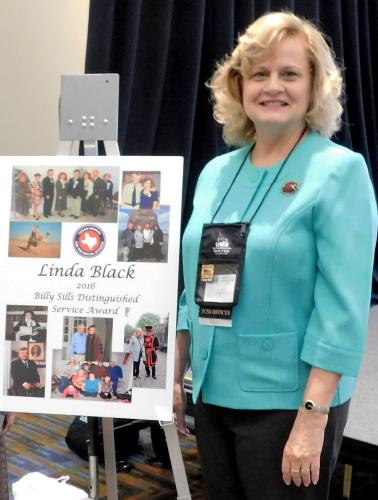NACOGDOCHES, Texas — Dr. Linda Black, associate professor in Stephen F. Austin State University’s Department of Secondary Education and Educational Leadership, received the Billy Sills Distinguished Service Award from the Texas Council for the Social Studies, which is a nonprofit organization serving social studies educators and supporters across the state.
The award honors members who have demonstrated exemplary service to the organization and exemplify the professional social studies educator, according to the council’s website.
“This award is recognition of a lifetime of classroom experiences trying to bring the love of history, and, in my case, of world history, to students for four decades,” Black said. “The award represents the memories of friends and colleagues who have enriched my life through their wisdom and knowledge of how to bring a love of learning about history to students.”
Black was presented with the award Oct. 15 at the annual conference in Corpus Christi.
“When it was announced that I had been chosen, I was surprised and humbled because I am following in the footsteps of many outstanding social studies educators who have been honored to win this award — many who have influenced me in my career along the way,” Black said.
Black has served the organization as president and board representative for the local council in Houston; parliamentarian, vice president and president of the state organization; and she was a member of the board of directors for the National Council for Social Studies. She also was awarded Secondary Teacher of the Year for the state organization in 1992, and in 1993, she was selected the national Secondary Social Studies Teacher of the Year.
“I have always wanted to become a teacher and loved history, so it was natural to become a history teacher. Even today, as I enter my 43rd year of teaching, I still enjoy working with students,” Black said. “Working with those who plan to become teachers is an exciting experience. The classroom is where I want to be, hoping to make a difference in future teachers’ lives and maybe in the lives of students they will teach.”
 Axe ’Em, Jacks!
Axe ’Em, Jacks!
